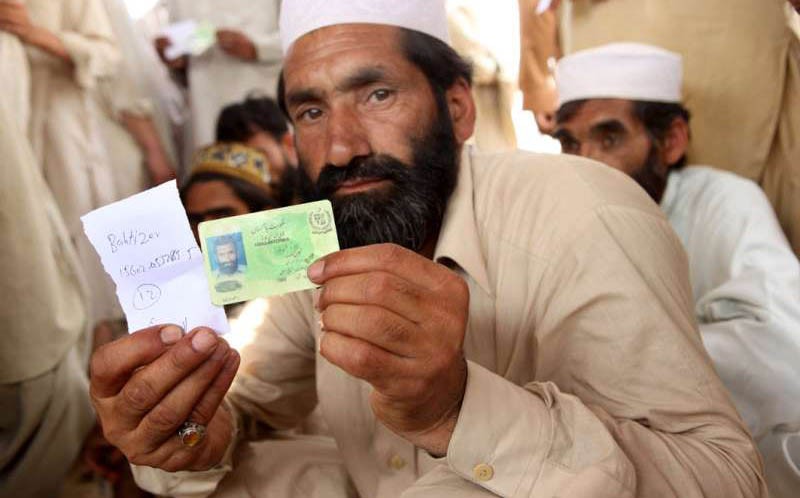A friend’s maid remains unidentified in the year 2021. No ID, no means of obtaining one, no access to facilities or future in terms of a better job or even having a bank account. And moreover so, the law states that she must bring a family member to the National Database & Registration Authority (NADRA) office if she wants a national ID. Her husband never took her to get one and has refused to do so for the future. The other family members are very few and cannot take her so she remains without anything for the 40 odd years she has lived in this country. Everybody keeps telling her to ‘just stand in line’ as our system has been updated. Yet it is the system process itself which fails her. This person is one of millions that will remain without the basic human right of any citizen in Pakistan for the rest of her life unless Pakistan changes its laws.
We were given many slogans about change. Yet even for the relief packages during the pandemic (that never went to her) basic human necessities and the rights of human beings are still being missed. This is not one person or one scenario. One could go to each and every house and the hired help or even find the labor force working on the streets, such as the daily wage worker and they will tell you a similar story. If this is true in the cities, one can only imagine the population of millions that reside in the villages across Pakistan. For both men and women, there is paperwork that is required where there are people residing in this country who have no access to the internet or even basic technology.
Pakistan must address this problem and fast if it wants to be considered an emerging nation. And this is not just for a national ID but for other important paperwork where the red tape and bureaucracy has crippled us in many sectors. It will not serve us well when we tout being a great tourist destination in articles yet there are witnesses to hundreds of thousands of children and families in the streets of Pakistan with begging bowls at every traffic light. These people have remained under the radar for generations. They moved and shifted each time a ‘cleanup’ drive happened; be it in the form of an anti-encroachment drive or movement away from certain areas only to resurface elsewhere. We all understand that the crime rate is certainly attached to a lack of addressing a population that goes missing.
In terms of the glaring refugee issues we have faced with the Afghan refugees and even others, a temporary solution could be in the form of strictly controlled residency programs which allow for the population mass to not only be identified but also have access to work. Integrate them and offer work accordingly. Give them due rights of a workforce which will not drive them into disappearing but highlight them transparently so they can contribute to the economy. A similar idea was successfully done by countries such as the UAE. Over there any person who is not a natural born resident (of Emirati descent/family) was not given a citizenship but residency cards which allowed them to work via work permits. This has catered for population control and monitoring or in extreme cases, the removal of unwanted elements. Although in our case it is a question of refugees and given the complexities of the problem it would be different, still, similar programs can be administered and catered accordingly to the situation.

Here, it is a matter of national security when a mass population of what is thought to be over 3 million Afghan refugees have attained by some means or the other a Pakistani ID card. This is failing on our part when a majority of Pakistanis themselves remain without NICs. Temporary residency/work permits for any refugee would not only have categorized them but they could have been segregated into categories accordingly. The same permits which at some point expired would be needed to be renovated or be faced with deportation. All things could be handled as they would have been above ground. The problem which opened the borders in the first place is decades old. Today, with the world being more integrated into the format of a global village, there should be a definite categorization and marker of identification for all humans that reside within this country; be it a refugee or the nation’s citizens.
Another point to note is that we must strictly implement the national minimum daily wage. A certain minimum amount has already been set for workers. None of this is known outwardly nor implemented by the class which is able to pay for hired help. Those with means must be required to pay the set minimum amount, this civic sense must be instilled in ourselves through education and the will or the drive to change. We speak so much of female empowerment in public forums yet how many actually address the issue of giving our house help their fair due?
To be fair, NADRA has certainly made progressive steps in updating their systems and have tackled many problems. SMART IDs as well as utilizing digital means to categorize and streamline processes are present. Once in the line, it will take you smoothly enough towards the ID process. However, one has to get to this process easily. Even till recently the current government had success especially with the relief efforts during lockdown days; they managed to identify and distribute much of the aid to deserving labor force. However, several figures have been missed.
Getting a family member only to go with you and accompany you to any office which deals with valuable paperwork is an archaic methodology. Recently, there was updated news on the status of orphans, the Sindh High Court directed NADRA to prepare a policy regarding the provision of NICs to orphans. It remains a shame that we have not been able to do this uptill now.
The people of this country, be it house help or laborers, are hardworking and are the sweat and blood of the nation. We must move forward to safeguard them by giving them their due rights. It will take years for this government to streamline processes, but given their fantastic run of things, I believe if anybody can, it will be this government that can make it happen. ID’ing the different segments that reside now in Pakistan will be more beneficial to the nation than leaving them out of the picture. We already recognize that this database in itself will be a key point of information where the control of the population will give Governments and authorities a better grasp of things. The question of the unidentified has already created a complex problem in terms of security and integration. If this one aspect is focused upon with greater efforts, it will certainly provide better security systems for our future.




